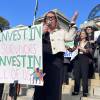Updated Nov. 1 at 6:43 p.m.
Boston City Council President Ed Flynn Tuesday called for appointing an independent panel to complete the process of redrawing voter districts for the next decade.
The move comes a day before the council’s redistricting chair Liz Breadon was set to recommend a new voter district map.
Flynn’s call for a pause conflicts with Breadon’s desire to move forward. Both moves follow an accusation of Open Meeting Law violation lodged by a coalition of South Boston community groups.
“I appreciate the efforts of my colleagues, however, this process has unfortunately become tainted and flawed,” said Flynn in a press release. “Many neighbors and community organizations have expressed concerns about a lack of transparency, potential violations of the Open Meeting Law, as well as the perceived influence of outside organizations to disregard the core of prior districts and communities of interest in an attempt to potentially gerrymander districts based on future races.”
Flynn’s attempt to halt the redistricting process is the latest development in a monthslong, internal fight over redistricting.
The end result will ultimately determine who wields political power in Boston. Race and ethnicity in the changing city have become flashpoints in the debate.
Redistricting has split the council, dominated for the first time by people of color, mostly along racial lines. Some white councilors are resistant to reshaping the new districts in ways that would weaken traditional bastions of white influence in Dorchester and South Boston. Councilors of color are seeking to expand opportunities for voters of color to form coalitions that could ultimately elect new district councilors.
Over the last week and a half, the council has met in person for several public technical sessions to rearrange precincts, the building blocks that make up voter districts. The aim, those familiar with the process have said, is to put about 75,000 voters in each of the city’s nine districts.
The nub of the problem is this: Flynn’s South Boston district, which includes the Seaport, has seen the greatest population growth in the city. Flynn has resisted reshaping his district because he wants to preserve the public housing communities that bookend his district. He also wants to maintain the Chinatown neighborhood as a district served by one councilor.
Flynn’s frequent political ally, Frank Baker represents a Dorchester-based district that has seen the greatest loss of Black voters, and the least growth of any of the city’s nine districts.
Breadon’s map proposes taking voters from Flynn’s South Boston district and depositing them into Baker’ Dorchester district.
“Sadly, due to the population growth in Southie, it’s necessary that they be reassigned to district three rather than district two,” she said in an interview with GBH News Tuesday. “This is not the only way, but this is a way that keeps the public housing in Southie together.”
Last week, Flynn called for a delay in the redistricting process, pointing to a recent memo from city attorney Adam Cederbaum stating that “there is no legal requirement that redistricting be completed until 2026.”
According to a copy of that memo obtained by GBH News, Cederbaum went on to say it “remains prudent for the City Council to diligently continue its work toward drawing electoral districts with mayoral approval keeping the November 7, 2022 date for one year of candidate residency in mind.”
Finishing voting maps by that Nov. 7 date, one day before Election Day, would ensure that potential political challengers and the public have exactly one year before the next election to understand where the city’s district lines fall.
On Tuesday, Flynn called for the process to be absorbed by a “blue-ribbon mapping panel,” expressing a lack of confidence in the council’s process to date.
“This commission can comprise of appointments made by the City Council, the Mayor's Office, Secretary of State, and the City of Boston Election Department,” Flynn said.
Correction: An earlier version of this story mischaracterized changes to Councilor Frank Baker’s district.







